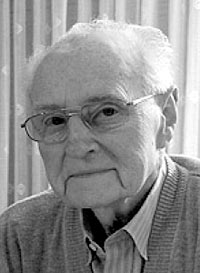Andreas Reder 1925-1911

Andreas Reder has been reporting for Cikó in the local newspaper for many years. For years, family news from his pen could be read in every issue. Many memories of life in Cikó were also published. He died on June 7th in Asslar. His daughter Gabriele Reder wrote the following obituary for him.
In addition to our personal experiences, my father left us a 56-page manuscript in which he reported in detail and impressively about his life in Cikó, his friends, little escapades and pranks during his school days, his internment in Russia and his return. He saw passing on the feelings and memories of his life path as a duty to his children and
grandchildren, among other things. Strangely enough, he never told us this during his lifetime and never gave us the manuscript to read. Impressed and deeply touched, I would like to pass this legacy on in memory of my father.
Andreas Reder was born on October 18, 1925 in Cikó as the second child of Adam and Susanne Reder, b. Hengl born. In September 1932 he started school in Cikó. The language of instruction was Hungarian, but since all the children in Cikó only spoke German and the teachers were of German descent, the first two school years were taught in German. He had a very
good school days and learning was very easy for him. In the third and fourth years of school he was even appointed class supervisor by teacher Schramm. One of my father's strengths was writing storytelling. Even in school he liked to write essays, was able to write down a scene in nature or an experience without difficulty and color it in language. Geography and history were also among his favorite subjects.
My grandparents always worked in the fields during the day, so that the children had a lot of freedom on the one hand, but were also very independent and responsible on the other. This independence - he always said - helped him to survive the difficult years later in Russian internment better, perhaps even to save his life.
After the fifth grade, my father went to the so-called citizen school in Szekszárd. This was 20 km away from Cikó and my grandfather found him a place to live with a Hungarian family there. He was torn from his familiar surroundings from one day to the next, spoke and understood very little Hungarian, even had to skip a school year and was far away
from family and friends by the standards of the time - in 1937, at the age of twelve Years!After getting used to it, he liked school well. On the weekends and during the holidays, however, he always enjoyed going to Cikó and never lost touch with his old schoolmates and his hometown.
On September 1, 1939, World War II broke out. At first, the outbreak of war was not taken that seriously in Cikó and life and learning went on as normal for him. On September 1, 1940 he switched to the commercial secondary school in Baja (approx. 40 km south of Cikó). It was the preparation for a commercial profession and my father graduated from school on
May 15, 1944 after four years of school with very good success with the Abitur (Matura). On June 1, 1944, he began his internship as an administrator in the parish hall in Cikó. [unsere-post.de]
CIKÓ-Ein Heimatbuch über die Ortgeschichte unsere Dorfes in Ungarn
By Andreas Reder
Foreword: Jakob Stumpf, Pfarrer
Published by Asslar, 1991
Cikó / Zicko , Zickau ,
Tolna megye / Tolnau county, settlement of the Germans 1719-1723, once a purely German settlement; The places of origin of many families are clarified in the following literature. Lit .: 1) Josef Klos and Andreas Reder: Ortssippenbuch Cikó / Hungary in Swabian Turkey 1730-1998, Griesheim 1998; 2) Cikó, a local history book about the local history of our village in Hungary, compiled by Andreas Reder, 1991, published by the “Heimatbuch Cikó” working group in Asslar. Communicated by Ilona Amrein, 12/2003.
|